Cost of living: Health workers on 24-hour strike in pay dispute
- Published
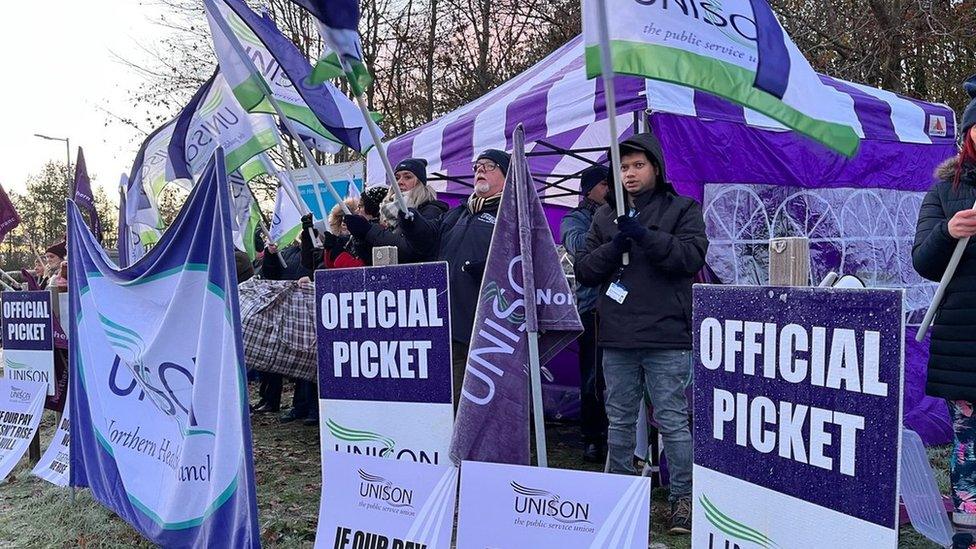
Members from Unison, Nipsa and GMB are involved in the strike
Health sector workers from three of NI's biggest unions are taking part in a 24-hour strike in a dispute over pay and conditions.
Members from Unison, Nipsa and GMB are involved.
Health workers have been told they will receive a 2022-23 pay award of £1,400, however, Unison's regional secretary said "it's not enough".
The union said the uplift would not settle the dispute as it was lower than inflation.
Scheduled hospital appointments and domiciliary care services are among those that have been affected.
Monday's strike in the health service is the first since 2019.
The chief executives of Northern Ireland's health trusts said contingency plans were in place to protect critical services and that they "obviously want to see all staff properly rewarded for their work".
Why have workers joined picket lines?
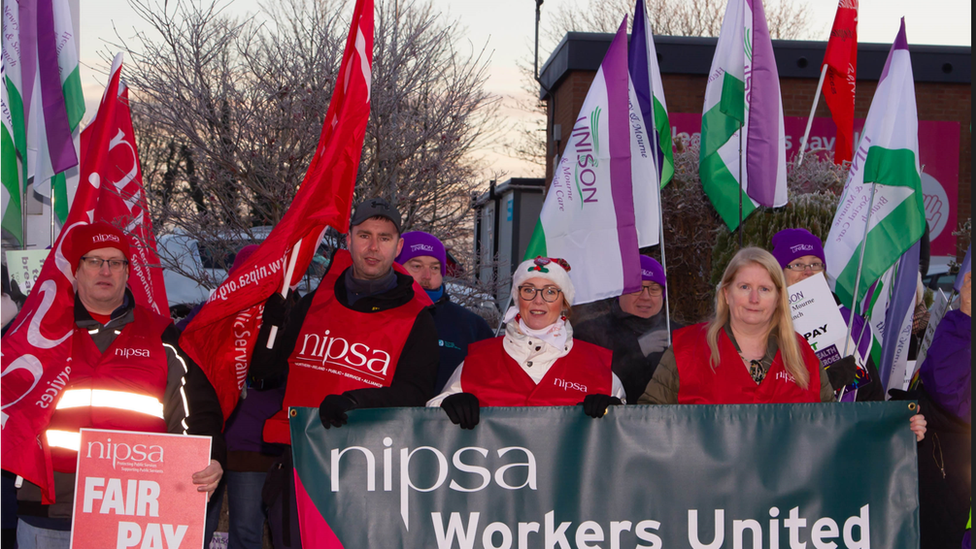
The unions are staging a 24-hour strike in a dispute over pay
Speaking from Antrim Area Hospital, staff nurse Yvonne Hegarty said it felt "degrading" to work in such a demanding job for what she described as "so little pay".
Ms Hegarty said caring for patients was her priority, but it was hard while worrying about things like the cost of food and fuel.
Social worker James Kehoe was among those striking at Altnagelvin hospital in Londonderry.
Mr Kehoe said health workers did a "sterling job" during the Covid-19 pandemic "when we got the claps from the politicians".
"Claps don't fill your oil tank, don't pay your electricity bill," he added.
"We're not able to make ends meet"
Paramedic Gabriel McComish was on the picket line at the Royal Victoria Hospital in Belfast.
Speaking as cars drove by beeping their horns, Mr McComish said he believed those on strike had the support of the public because they were "fighting for better patient care".
Domiciliary care worker Pamela McKenzie said she joined the picket line at Ards Community Hospital because she "can't afford to live any more".
Ms McKenzie said striking was "a very hard decision to make, but I have a family too. I have bills to pay".
'Get back to Stormont'
Stephanie Greenwood, Unison chairperson for the Northern Trust, warned that health workers were willing to take "continuous action" to achieve "a decent wage that they can live on", as well as safe staffing levels and a better service for patients.
She urged Northern Ireland's politicians to "get back to Stormont".
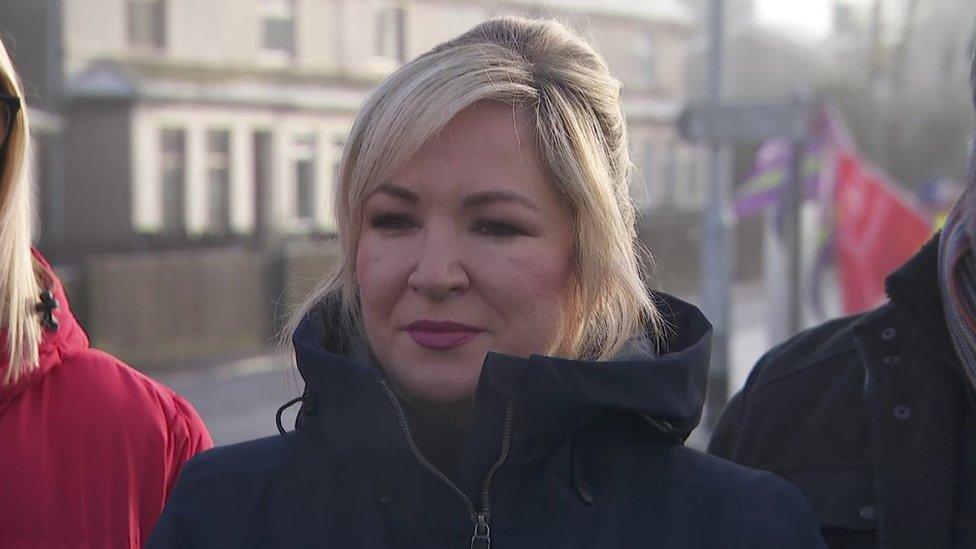
Sinn Féin deputy leader Michelle O'Neill said health workers should not have to strike in sub-zero conditions
Speaking at a picket line outside South Tyrone Hospital in Dungannon, Sinn Féin deputy leader Michelle O'Neill said the UK government needed to "get real".
"They need to get around the table and they need to bring forward a deal that actually meets the needs of the workers," she said.
Ms O'Neill said health workers should not have to strike in sub-zero conditions "campaigning for what is rightfully theirs".
'Fighting back'
Nipsa deputy secretary general Padraig Mulholland said people were "fighting back".
Speaking to BBC Radio Foyle, he said: "We are not prepared to see unsafe staffing become the norm in the health service."
In a joint statement, the chief executives of Northern Ireland's health trusts said contingency plans were in place to mitigate disruption to services during the strike.
"We obviously want to see all staff properly rewarded for their work. They have been impacted heavily by cost-of-living increases and escalating pressures on health and social care services."
The statement reiterated previous comments that the funding model for the health service made it "impossible to plan for the long term" and said the current system was "unsustainable".
Speaking to BBC Radio Ulster's Evening Extra programme, Mark Cochrane, assistant director of operations with the NIAS, said waiting times had increased but ambulances are still available.
Average response time for category one cases are about a minute longer than last Monday, and four minutes longer for category two cases.
Mr Cochrane said that there had been close co-operation with trade union members in order to mitigate the affect on service "as much as possible".
"In terms of the service, we're very keen to support the strike and to support our staff to take industrial action," he said.
"If you need an ambulance you should continue to phone for an ambulance, our control rooms are functioning as normal and we will categorise those calls and make an assessment of how urgent the call is."
BBC News NI understands that Monday has been "manageable" so far within the ambulance service, mostly attributable to good communication between management and the health unions over the past few weeks as they prepared for the strike.

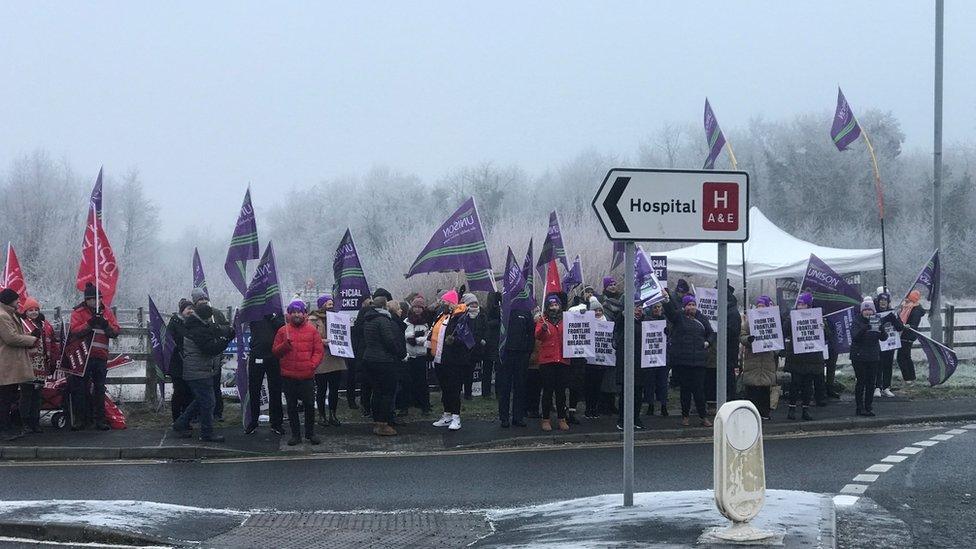
At the scene, Cormac Campbell
At Craigavon Area hospital this morning a crowd of more than 200 striking healthcare workers gathered at the main entrance to the site.
They were in two main groups - one in the centre of one of Craigavon's many roundabouts, the other beside a large roadside marquee erected to provide food, hot drinks and respite from the cold.
And it was very cold. Still -5C on my car's thermometer at midday.
Couple that with heavy fog and you could be forgiven for thinking that a smaller crowd would have been in place.
They say they're staying put until 8pm tonight.
Some of the union reps are playing music to keep the spirits and body temperatures up.
A number of vehicles passing have been honking horns in support of the striking workers and ambulances continue to enter and exit the hospital site.

The unions have campaigned about pay levels at a time of rising inflation and on issues such as staffing levels within the health service.
A pay uplift which was announced by Stormont's Department of Health last Thursday came after a recommendation by an independent review body.
It followed legislation at Westminster which allowed civil servants to enact the proposal in the absence of a health minister.
In its guidance, the Department of Finance has said pay awards to public sector workers must be affordable for the Stormont budget.
Royal College of Nursing leader Pat Cullen says "my door is open"
Meanwhile, talks to avert strike action by nurses have failed, with the union accusing the health secretary of "belligerence".
The head of the Royal College of Nursing (RCN), Pat Cullen, said strikes in England, Wales and Northern Ireland would now go ahead on Thursday, after Steve Barclay refused to discuss pay.
The government said it would continue to engage on non-pay related issues.
Unison and Nipsa members have been taking part in industrial action since 5 December, with a work-to-rule policy.
From Tuesday, the unions have said they will return to their previous action which is short of strike.
- Published12 December 2022
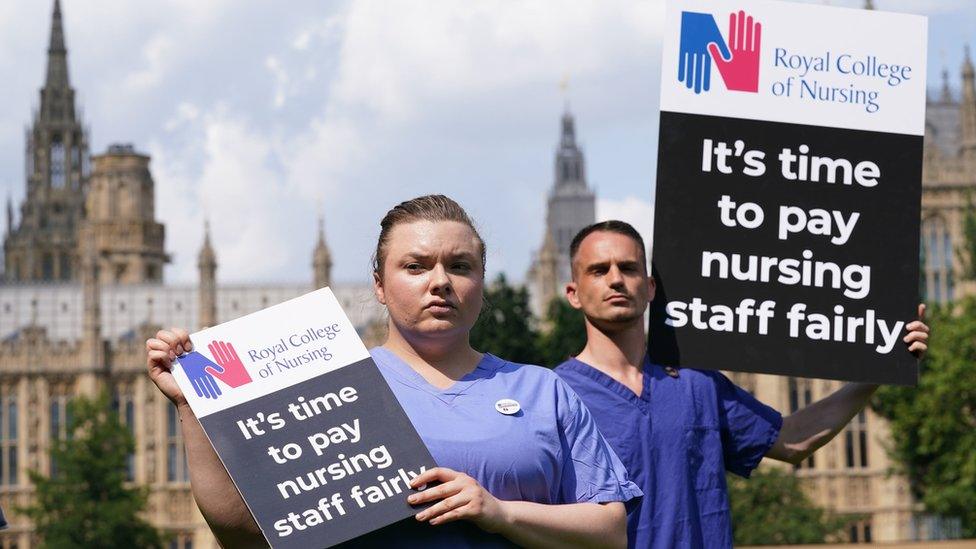
- Published8 December 2022
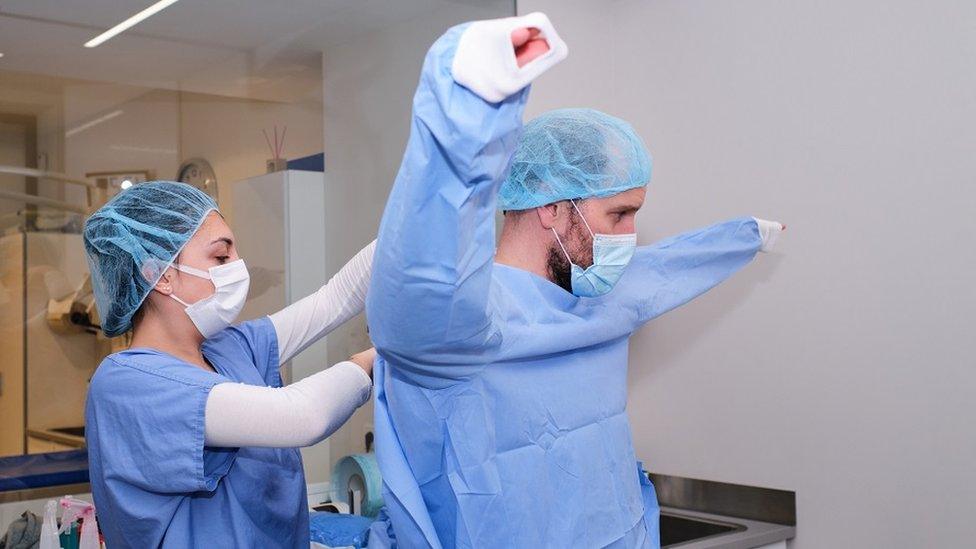
- Published24 November 2022
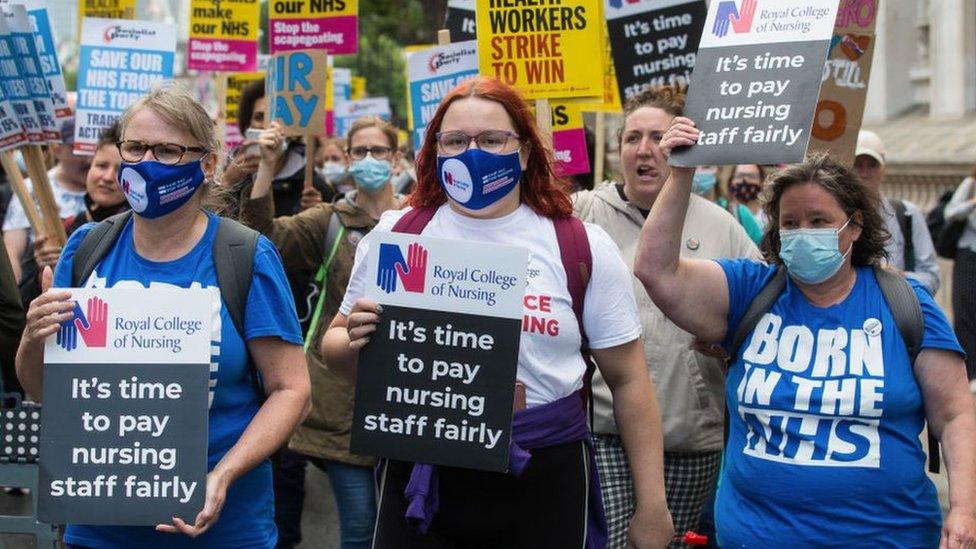
- Published8 December 2022
